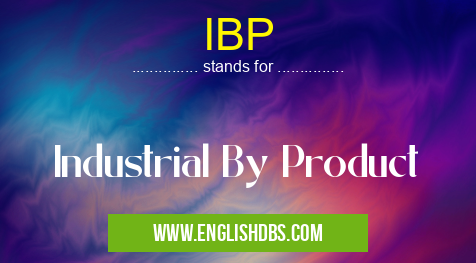What does IBP mean in UNCLASSIFIED
IBP stands for Industrial By Product. It refers to a secondary product or material that is generated as a result of another industrial process. IBPs are typically not the primary intended product of a manufacturing or industrial operation but are produced as a byproduct or waste stream.

IBP meaning in Unclassified in Miscellaneous
IBP mostly used in an acronym Unclassified in Category Miscellaneous that means Industrial By Product
Shorthand: IBP,
Full Form: Industrial By Product
For more information of "Industrial By Product", see the section below.
Introduction: IBP Meaning and Its Significance
Importance of IBPs
IBPs can have significant economic and environmental implications for industries. By utilizing IBPs, companies can:
- Reduce waste: IBPs can be used to repurpose or recycle waste materials, minimizing their environmental impact.
- Generate revenue: IBPs can be sold or used for other purposes, creating additional revenue streams.
- Enhance sustainability: IBPs can contribute to sustainable practices by reducing reliance on raw materials and minimizing waste.
Utilization of IBPs
IBPs can be utilized in various ways, including:
- As raw materials: IBPs can be used as inputs for other manufacturing processes or industries.
- For energy production: IBPs, such as biomass or waste materials, can be used to generate energy.
- For construction: IBPs, such as fly ash or slag, can be used in construction materials like cement or concrete.
Conclusion: Economic and Environmental Benefits
IBPs play an important role in reducing waste, generating revenue, and enhancing sustainability in industries. By utilizing IBPs effectively, companies can create a more circular economy and contribute to a cleaner and healthier environment.
Essential Questions and Answers on Industrial By Product in "MISCELLANEOUS»UNFILED"
What is an Industrial By Product (IBP)?
An IBP is a substance or material that is produced as a secondary result of an industrial process. It is not the primary intended product but is created as a consequence of the production process.
Are IBPs valuable?
Some IBPs may have commercial value and can be sold or used as raw materials for other products. However, others may be considered waste products and require proper disposal.
How are IBPs managed?
The management of IBPs varies depending on their nature and value. Some IBPs are recycled or reused within the industry, while others are sold as byproducts or disposed of safely.
What are some examples of IBPs?
Examples of IBPs include:
- Fly ash from coal-fired power plants
- Slag from metal production
- Paper pulp from paper manufacturing
- Waste heat from industrial processes
What are the environmental implications of IBPs?
Improper management of IBPs can have environmental consequences. Some IBPs may contain hazardous substances that can pollute air, water, or soil if not disposed of properly.
How are IBPs regulated?
In many countries, IBPs are regulated under environmental laws and regulations. These laws may require industries to minimize the generation of IBPs, properly dispose of them, or find beneficial uses for them.
IBP also stands for: |
|
| All stands for IBP |
